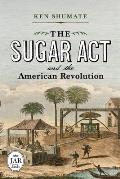I’m pleased to know about this study because I’ve long seen histories mention the Sugar Act of 1764 as colonial Americans’ first grievance of the decade. It prompted James Otis’s pamphlet The Rights of the British Colonies Asserted and Proved, which established “no taxation without representation” as the logical foundation for colonial resistance (without using that phrase, which didn’t appear until 1768).
And yet in looking at the more widespread resistance to the Crown in the late 1760s, and reading the colonists’ own arguments, the taxes and restrictions on sugar (and molasses, and rum, and later coffee and wine) show up barely at all.
Shumate’s study offers some explanations. First, the traders of the 1760s were used to an imperial tax on molasses, which was first instituted in 1733. The main purpose of that law was to discourage trading with French, Spanish, and Dutch West Indies, so objecting to it didn’t come across as patriotic or law-abiding. It was easier to smuggle quietly.
Then in 1764 prime minister George Grenville revised the law, actually cutting the duty in the hope that more American merchants would see obeying the law as the economical alternative. Then in early 1766 the Marquess of Rockingham’s government reduced the duty still further. There was literally less to complain about. To be sure, that last revision meant the government was taxing molasses from the British islands, too, but the North Americans were so pleased with Rockingham’s repeal of the Stamp Act that they didn’t raise a fuss.
Another big factor in the colonial response, I think, was that that Sugar Act’s taxes and trade restrictions affected only a small portion of the population. Molasses traders and rum distillers were a special interest. The biggest threat to their business actually came from distillers on the British Caribbean islands producing their own rum instead of shipping all the raw material to the mainland.
In contrast, the Stamp Act affected everyone in the colonies who filed or responded to lawsuits, read newspapers, got married, and more, which meant everyone. Though rum made from molasses was popular, tea was even more popular, so Charles Townshend’s 1767 tax on that import produced more widespread, longer-lasting opposition.
As McCurdy writes:
Although strict enforcement actually increased with the 1766 revision, the Americans raised few objections to the Sugar Act. Instead, between 1768 and 1772, the law brought in nearly £165,000 from duties on molasses, sugar, madeira, and other goods. But taxing British sugars did little to stem the tide of foreign products as 97 percent of the four million gallons of molasses that came into America derived from foreign sources.Looking back, writers started to treat the Sugar Act as the start of their troubles. At the time, however, colonists saw bigger things to complain about.
Colonial ambivalence toward the Sugar Act continued despite the Townshend duties of 1767. Although Boston merchants demanded that no British goods would be imported until all taxes were repealed — including the Sugar Act — resistance from merchants in Philadelphia and New York forced them to drop this demand. Indeed, it was not until after the Boston Tea Party of 1773 and the Coercive Acts of 1774 that Americans turned against the Sugar Act.

No comments:
Post a Comment